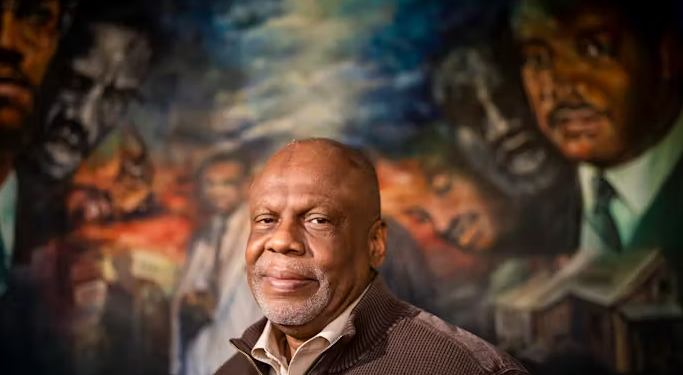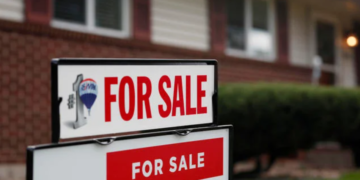Rev. Alfred Babington-Johnson, CEO of the Minneapolis-based Stairstep Foundation, pictured at their headquarters in Minneapolis in October 2020. — Leila Navidi, Star Tribune
July 17, 2024 Story by: Editor
A Black civil rights organization claims that a state affordable housing finance agency is worsening racial segregation and that the group’s concerns are not addressed in a new report to the U.S. Civil Rights Commission.
Rev. Alfred Babington-Johnson, CEO of Minneapolis-based Stairstep Foundation, which works with more than 100 Black churches, testified to the commission’s Minnesota Advisory Committee that the housing agency has not appropriately allocated subsidized housing.
The testimony came a year after he sued Minnesota Housing, alleging it prevented the construction of subsidized housing in affluent, predominantly white areas. The suit claims that this has barred many low-income, non white residents from accessing economic and educational opportunities. The Metropolitan Council was also named as a defendant.
“Contrary to their mandate, these entities have not encouraged or allocated subsidized housing development appropriately, and as a consequence, they have become complicit in advancing racial segregation and causing economic disadvantage to vulnerable segments of our society, particularly the Black community,” Babington-Johnson testified.
However, mention of the Ramsey County suit and the issues it raised were removed from an earlier draft of a report to the Civil Rights Commission that came out Tuesday. The report makes 18 recommendations, including passing a universal rental assistance law, expanding the Fair Housing Act to bar discrimination based on income source, and strengthening a provision in the act requiring that communities receiving federal funds seek to eliminate segregated living patterns.
Advisory committee chair Beth Commers told the Star Tribune that the panel started to analyze Minnesota Housing’s strategic plan. However, after listening to testimony on broader housing issues, the panel expanded the report’s scope to address civil rights themes in housing affordability and equitable access to housing in Minnesota. Commers noted insufficient funding for the repair and upkeep of affordable units as one of the issues.
The panel removed mention of Babington-Johnson’s lawsuit in a draft because “it didn’t fit, and we didn’t want to take a position on a case that’s in front of the court,” Commers said. Some of Babington-Johnson’s remarks remain. Overall, the report calls for affordable housing units to be available throughout the state “to allow Minnesotans to maximize housing choice.”
Commers also wants state legislation to set zoning requirements for municipalities across Minnesota to allow for more diverse affordable housing stock, such as six- to eight-unit buildings, instead of mostly single-family homes.
“Otherwise, communities get to choose what kind of housing to allow and what kind of housing to not allow,” Commers said.
Committee member William Stancil was the sole panelist opposing the changes, questioning why they repeatedly invited Babington-Johnson to testify and then removed mention of the suit. He voiced concern that the report was siding with industry groups that oppose Babington-Johnson’s ideas.
One such group, Equity in Place, told the committee that it sees the “areas of opportunity” framework—the crux of Babington-Johnson’s lawsuit and testimony—as dated and leading to a reduction in affordable housing investment in communities of color. Equity in Place, a coalition of organizations led by people of color and housing advocacy groups, argued that this policy is often used against communities of color fighting gentrification and displacement.
Minnesota Housing funds more subsidized units in the Twin Cities than any other entity and allocates Low-Income Housing Tax Credits.
In its lawsuit, Stairstep Foundation said 35% of the region’s subsidized affordable housing is located in “racially concentrated areas of poverty,” and only 1.3% in “racially concentrated areas of affluence.” In census tracts greater than 30% nonwhite in Minneapolis and St. Paul, there is approximately one subsidized housing unit for every four nonsubsidized units, according to the suit. But in tracts less than 30% nonwhite, there is about one subsidized housing unit for every 24 nonsubsidized ones.
Minnesota Housing and the Met Council denied the lawsuit allegations in court papers filed last month, although the former admitted that the region’s housing is racially segregated by some metrics.
During testimony, Minnesota Housing Commissioner Jennifer Leimaile Ho objected to a statement in the report that most affordable housing in the state has been built in the urban core of Minneapolis and St. Paul. The report, she said, needs to clarify that Minnesota Housing is not “concentrating” or “clustering” affordable housing.
In the last several years, she said, 63% of the new rental units in the Twin Cities metro area that have been awarded funds through the agency’s Consolidate Request for Proposals have been in the suburbs, while 37% have been in Minneapolis-St. Paul. Ho added the agency is funding housing in a wide range of communities.
Babington-Johnson and University of Minnesota Law School Prof. Myron Orfield dispute those numbers. Orfield, who also testified before the committee, said the share of Minnesota Housing funding going to the suburbs is 41% over the past five years, although the suburbs make up 75% of the metro area. Minneapolis and St. Paul have 60% of the units even though they have 25% of the population, he said.
Babington-Johnson wrote a letter to the committee in June raising objections that the advisory committee had “abruptly stripped” reference to the civil rights issues on which he had testified, while incorporating Ho’s statistics. He said the committee had fallen short of its obligation to fully incorporate all civil rights concerns.
John Powell, professor of African American studies and ethnic studies at the University of California at Berkeley, also wrote to the committee saying he strongly objected to striking references to the “opportunity neighborhood framework” embedded in America’s fair housing law—a central part of Babington-Johnson’s lawsuit. He said the suit against Minnesota Housing is one of the most important fair housing cases before the courts nationwide. Source: Star Tribune















